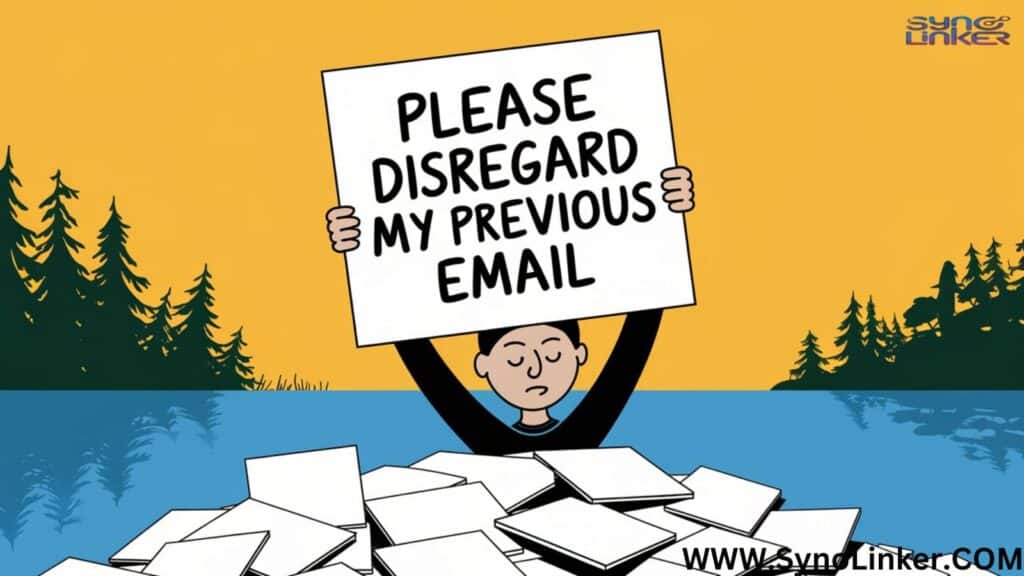Ever hit that “Send” button only to realize you’ve made a mistake? We’ve all been there. While “Please disregard my previous email” gets the job done, it can sound a bit stiff. Let’s explore some alternative ways to handle those pesky email errors with grace and style.
Here Are 20 Other Ways To Say “Please disregard my previous email”
- Oops, I jumped the gun!
- I’d like to update my previous message
- New information has come to light
- I’d like to clarify my previous email
- Scratch that last email!
- I need to revise my previous statement
- Let’s take a mulligan on that last email
- I’d like to amend my previous email
- Correction to my last email:
- I’ve got an update on my last email
- Let’s hit the reset button on that last email
- I’d like to offer a quick amendment to my previous email
- Rewind! I need to correct something from my last email
- I’ve got some updated information to share
- Allow me to fine-tune my last message
- I’d like to revise a point from my earlier email
- Oops, my crystal ball was foggy!
- I need to make a slight course correction
- Let’s circle back to my last email
- I’d like to polish up my previous message
1. “Oops, I jumped the gun!”
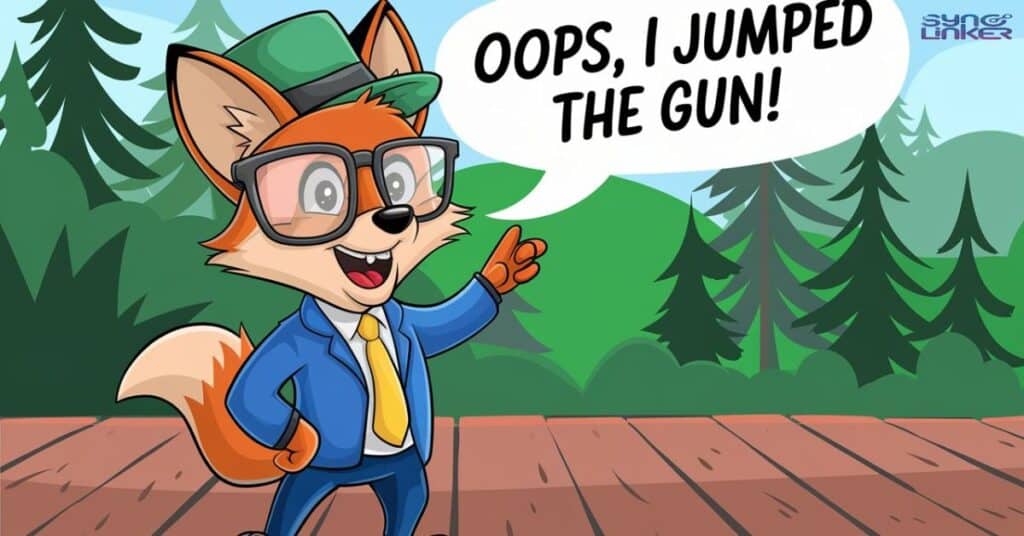
This casual approach works well for minor slip-ups with colleagues you know well. It adds a touch of personality while acknowledging the mistake.
Example:
Hey Sam, Oops, I jumped the gun! That last email about the project deadline was premature. We’ve actually got until next Friday, not this Friday. My calendar playing tricks on me again! Let’s catch up tomorrow to discuss the real timeline. Cheers, Alex
Read more about 20 Other Ways to Say ” Happy Valentine’s Day”
2. “I’d like to update my previous message”
For a more formal tone in professional emails, this phrase maintains professionalism while clearly indicating a correction is coming.
Example:
Dear Dr. Martinez, I’d like to update my previous message regarding the conference schedule. Upon double-checking with the organizing committee, I can confirm that your keynote speech is scheduled for 2 PM, not 3 PM as originally stated. My apologies for any confusion this may have caused. Please let me know if you need any further information. Best regards, Jordan Lee Conference Coordinator
3. “New information has come to light”
This phrase works well when you’re correcting email content due to receiving updated information, rather than making a mistake.
Example:
Hi Team,
New information has come to light regarding our Q3 projections. In my earlier email, I shared preliminary figures that have since been revised. Please refer to the attached updated report for the most accurate forecast.
We’ll discuss these changes in detail during our next team meeting.
Thanks for your understanding,
Priya
4. “I’d like to clarify my previous email”
Use this when you need to expand on or clarify information from a previous message, rather than completely retracting it.
Example:
Dear valued customer, I’d like to clarify my previous email about our summer sale. While all items are indeed discounted, I forgot to mention that this excludes our new fall collection. My apologies for any confusion this may have caused. To make it up to you, we’re offering an additional 5% off your next purchase with code CLARIFY5. Happy shopping! Emma, Customer Service Representative
5. “Scratch that last email!”
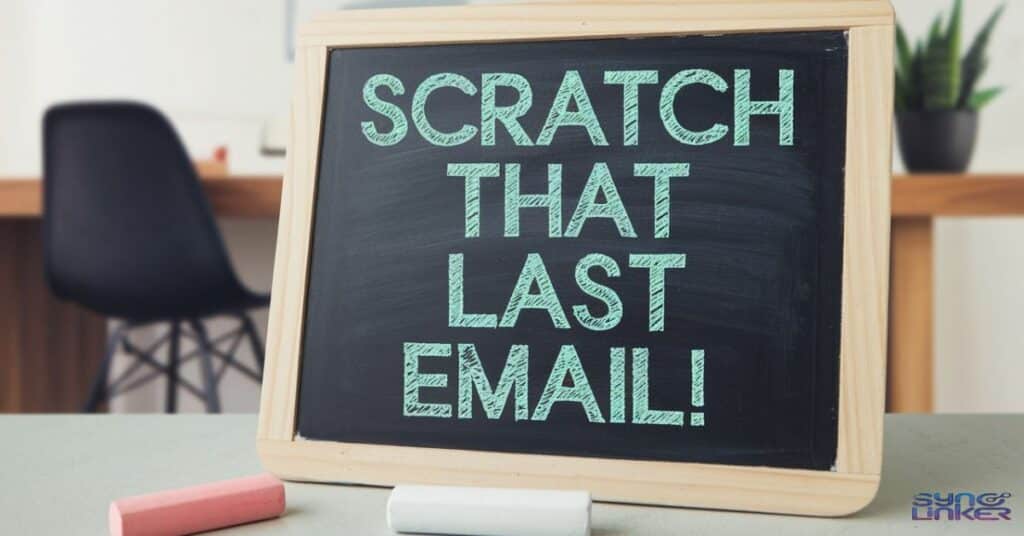
This casual, friendly approach works well for minor typos or small mistakes in less formal settings.
Example:
Hey Charlie, Scratch that last email! I totally mixed up our lunch plans. We’re meeting at Café Bleu, not Café Rouge. My taste buds were clearly dreaming of that amazing French onion soup! See you at the right place at 1 PM? Cheers, Pat
6. “I need to revise my previous statement”
For more significant blunders or in formal settings, this phrase conveys the seriousness of the correction while maintaining a professional tone.
Example:
Dear Board Members, I need to revise my previous statement regarding the company’s financial projections for the upcoming fiscal year. After a thorough review with our finance team, we’ve identified some discrepancies in the initial calculations. I’ll be sending out a comprehensive revised report within the next 24 hours. My sincere apologies for this oversight. Respectfully, Samantha Johnson, CFO
Read more grammar lessons on Synolinker
7. “Let’s take a mulligan on that last email”
This golf-inspired phrase adds a dash of humor to your communication strategies, perfect for lightening the mood after a mistake.
Example:
Hi Marketing Team, Let’s take a mulligan on that last email about the product launch date. Turns out, I was looking at last year’s calendar (note to self: time travel isn’t possible yet). Our actual launch date is July 15th, not June 15th. This gives us an extra month to polish our campaign. Silver linings, right? Let’s regroup tomorrow to adjust our timeline. Best, Marcus
8. “I’d like to amend my previous email”
This formal yet friendly phrase works well in professional settings where you need to maintain professionalism while acknowledging a mistake.
Example:
Dear Dr. Thompson, I’d like to amend my previous email regarding your research grant application. Upon further review, I realize I mistakenly stated that the deadline was next month. In fact, the correct deadline is the end of this week. My sincere apologies for any inconvenience this may have caused. Please let me know if you need any assistance in expediting your application. Warm regards, Lila Chen, Grant Coordinator
9. “Correction to my last email:”
Sometimes, straightforward is best. This phrase clearly indicates that you’re about to provide corrected information.
Example:
Hello team, Correction to my last email: The client meeting is scheduled for Thursday at 2 PM, not Wednesday at 2 PM as previously stated. My apologies for the mix-up. Please update your calendars accordingly. Looking forward to seeing you all there. Thanks, Raj
You might be interested in 20 Other Ways to Say ““Happy Sunday”
10. “I’ve got an update on my last email”
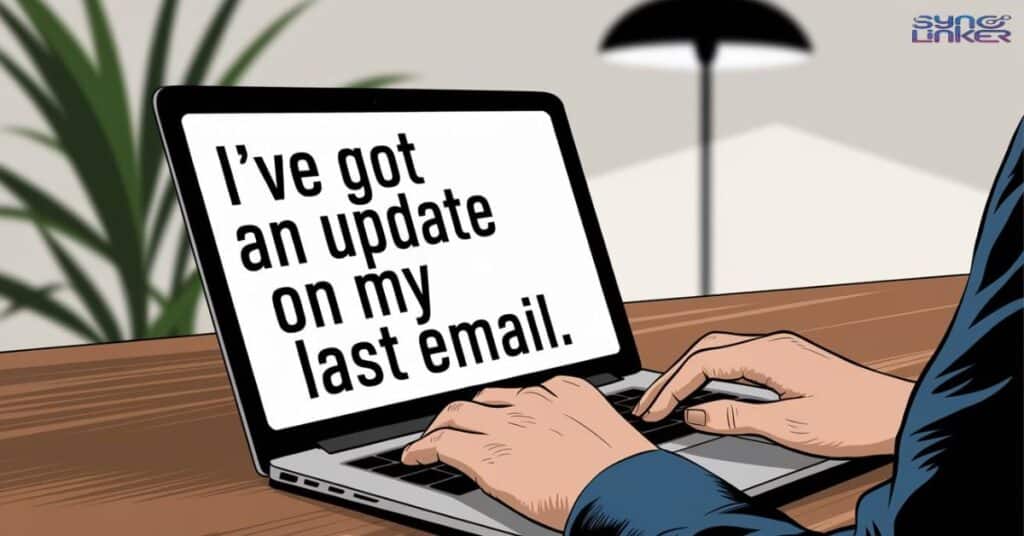
This casual yet clear phrase works well when you have new information to share that supersedes your previous message.
Example:
Hi Sarah, I’ve got an update on my last email about the team-building event. Turns out, the escape room we booked is undergoing renovations next week. But don’t worry! I’ve found an even cooler virtual reality experience we can do instead. Same time, different place. I’ll send out the new details shortly. Excited for this! Leo
11. “Let’s hit the reset button on that last email”
This playful phrase works well in casual work environments, especially with tech-savvy colleagues.
Example:
Hey Dev Team, Let’s hit the reset button on that last email about the new feature rollout. I mixed up our staging and production timelines (classic rookie move, right?). Here’s the correct schedule: – Staging: Next Monday – Production: Following Friday My bad for the confusion. Let’s chat at our stand-up if you have any questions. Cheers, Zack
12. “I’d like to offer a quick amendment to my previous email”
This formal yet friendly approach works well when you need to make a small correction without making a big fuss.
Example:
Dear Ms. Rodriguez, I’d like to offer a quick amendment to my previous email regarding your speaking engagement at our annual conference. The correct date for your keynote is September 15th, not September 5th as I mistakenly wrote. My apologies for any confusion this may have caused. We’re very much looking forward to hearing your insights next month. Best regards, Tanya Wells Event Coordinator
13. “Rewind! I need to correct something from my last email”
This casual, fun phrase can help lighten the mood when correcting a mistake with close colleagues or in a relaxed work environment.
Example:
Hi Marketing Mavens, Rewind! I need to correct something from my last email about our social media campaign. Turns out, National Donut Day is the first Friday in June, not July (though I wish it were every month!). Let’s brainstorm some delicious content ideas for the right date. Who’s up for a donut-tasting editorial meeting? Sweet regards, Jasmine
14. “I’ve got some updated information to share”
This phrase works well when you’re not so much correcting an error as providing new, more accurate information.
Example:
Hello Logistics Team, I’ve got some updated information to share regarding our shipment to Brussels. In my previous email, I mentioned a delay due to customs issues. However, I’ve just heard from our shipping partners that they’ve managed to expedite the process. The new estimated arrival date is next Tuesday, not Friday as previously thought. Great news for our timeline! Let’s discuss how to best use this extra time in our next team meeting. Best, Omar
15. “Allow me to fine-tune my last message”

This polite phrase works well in professional settings where precision is key, acknowledging that you’re making a subtle but important adjustment.
Example:
Dear Dr. Chen, Allow me to fine-tune my last message about the research grant application. While the core details remain the same, I need to clarify the submission process. Rather than emailing your application, please use our new online portal at [insert URL]. This system will allow for easier tracking and faster processing of your application. Thank you for your understanding as we improve our procedures. Best regards, Amelia Santos Grant Review Board
16. “I’d like to revise a point from my earlier email”
Use this when you need to correct a specific detail without retracting the entire message.
Example:
Hi Team Leaders, I’d like to revise a point from my earlier email about our quarterly goals. While reviewing our metrics, I noticed an error in the customer acquisition target. The correct goal is a 15% increase, not 25% as previously stated. This adjustment aligns more realistically with our current growth trajectory and resource allocation. Let’s discuss strategies to meet this revised goal in our next leadership meeting. Thanks for your attention to this update. Best, Carlos VP of Operations
17. “Oops, my crystal ball was foggy!”
This humorous approach works well for minor typos or small mistakes, especially when predicting future events or dates.
Example:
Hey Events Crew, Oops, my crystal ball was foggy! In my last email about the company picnic, I predicted sunny skies. Turns out, Mother Nature has other plans. The forecast now shows a 60% chance of rain for Saturday. No worries though – I’ve already reserved our backup indoor venue. Same time, new place. I’ll send the updated location details shortly. Here’s hoping my next weather prediction is more accurate! Cheers, Ravi
18. “I need to make a slight course correction”
This nautical-inspired phrase is great for subtle changes or updates to previous email content.
Example:
Dear Investors, I need to make a slight course correction to the information shared in my previous email about our Q4 projections. After consulting with our CFO, we’ve adjusted our expected growth rate from 7% to 6.5%. While this is a minor change, we believe it presents a more accurate and conservative estimate given current market conditions. Rest assured, we’re still on track for a strong finish to the year. I’ve attached an updated report with detailed analysis. Please don’t hesitate to reach out if you have any questions. Warm regards, Sophia Lee CEO, TechNova Inc.
19. “Let’s circle back to my last email”
This phrase is useful when you want to revisit a topic and provide additional or corrected information.
Example:
Hi Sales Team, Let’s circle back to my last email about the new product launch. I’ve just finished a meeting with R&D, and there are a few exciting updates I want to share: 1. The release date has been moved up by two weeks. 2. We’ve added an additional feature that I think will be a game-changer for our clients. 3. The pricing structure has been slightly adjusted to reflect these changes. I’ll be sending out a comprehensive brief later today. In the meantime, feel free to ping me with any questions. Let’s make this launch our best one yet! Cheers, Alex
20. “I’d like to polish up my previous message”
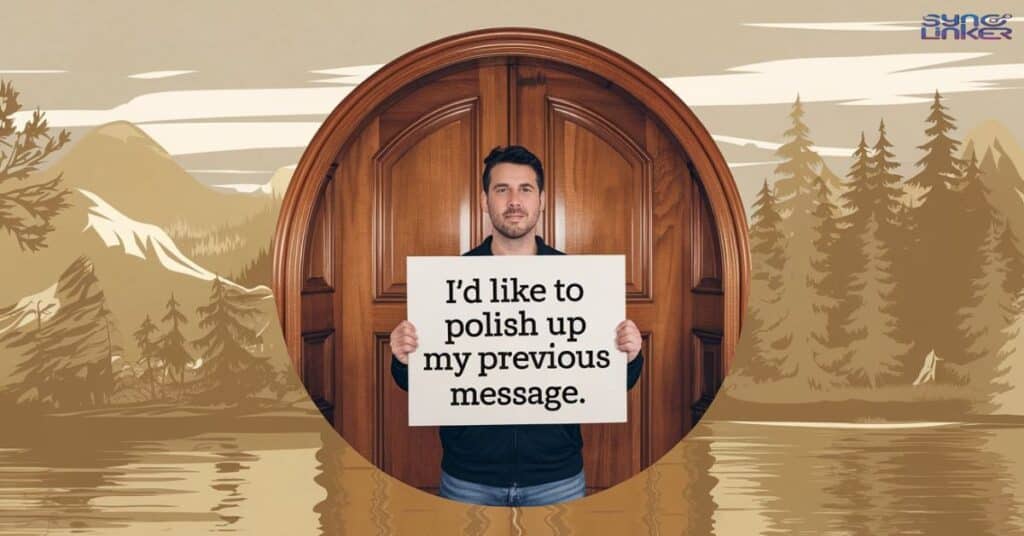
This phrase acknowledges that your initial communication might have been a bit rough around the edges and that you’re now providing a more refined version.
Example:
Dear Editorial Board, I’d like to polish up my previous message regarding the upcoming issue’s theme. After further brainstorming with the creative team, we’ve developed a more cohesive concept that I believe better reflects our magazine’s vision. Instead of “Urban Living in 2030,” we’re proposing “Sustainable Cities: Blueprints for Tomorrow.” This slight shift allows us to cover a broader range of topics while still focusing on future urban development. I’ve attached a detailed outline of potential articles and visual spreads. Looking forward to your thoughts on this refined direction. Best regards, Nadia Chief Editor
Wrapping Up: Mastering the Art of Email Correction
In today’s fast-paced digital world, knowing how to gracefully handle email mistakes is a crucial skill. Whether you’re dealing with minor typos or more significant blunders, these alternative ways to say “please disregard my previous email” can help you navigate tricky situations with ease.
Remember, the key to effective communication strategies lies in choosing the right tone for your audience and the situation at hand. Whether you opt for a formal “I’d like to amend my previous email” or a casual “Oops, I jumped the gun!”, the goal is to clearly acknowledge the error and provide correct information.
Proper email etiquette isn’t just about avoiding mistakes—it’s also about knowing how to handle them when they inevitably occur. By mastering these phrases and understanding when to use them, you’ll be well-equipped to maintain professionalism and clarity in your digital communications.
So the next time you find yourself needing to rectify email errors, don’t panic. Take a deep breath, choose the appropriate phrase from this list, and remember that everyone makes mistakes. It’s how we handle them that truly matters.
Now, armed with these alternative ways to handle email slip-ups, you’re ready to navigate the sometimes turbulent waters of professional communication with confidence and grace. Happy emailing!

Emily Hanis is an experienced writer with a passion for all things grammar. With years of expertise in the field, she brings clarity and creativity to her content, making complex language rules easy to understand. On her blog, Emily shares practical tips, grammar insights, and a rich collection of synonyms to help readers enhance their writing skills. Her engaging style makes learning grammar both informative and fun.

